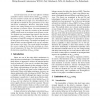Free Online Productivity Tools
i2Speak
i2Symbol
i2OCR
iTex2Img
iWeb2Print
iWeb2Shot
i2Type
iPdf2Split
iPdf2Merge
i2Bopomofo
i2Arabic
i2Style
i2Image
i2PDF
iLatex2Rtf
Sci2ools
ITC
2003
IEEE
2003
IEEE
Detection of Resistive Shorts in Deep Sub-micron Technologies
Current-based tests are the most effective methods available to detect resistive shorts. Delta IDDQ testing is the most sensitive variant and can handle off-state currents of 10-100 mA of a single core. Nevertheless this is not sufficient to handle the next generations of very deep sub-micron technologies. Moreover delay-fault testing and very-low voltage testing are not a real alternative for the detection of resistive shorts. The main limitation of ∆IDDQ testing is the intra-die variation of the threshold voltage which results in variations in the off-state current. Two methods are investigated that improve the detection capabilities of ∆IDDQ testing. The first method reduces the impact of intra-die variation by reducing the amount of logic that switches states. This method can handle very large off-state currents although at the cost of a substantial increase in test time. The second method investigates the correct scaling of the intra-die variations as a function of temperat...
| Added | 04 Jul 2010 |
| Updated | 04 Jul 2010 |
| Type | Conference |
| Year | 2003 |
| Where | ITC |
| Authors | Bram Kruseman, Stefan van den Oetelaar |
Comments (0)

